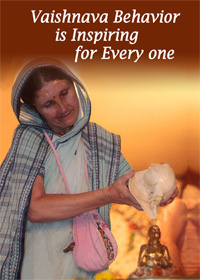
1. Preaching accompanied with Vaishnava etiquette: We have to push forward this movement, and we may get caught up in the activities of pushing, and forget about Vaishnava etiquette. However, there is an exchange between Srila Sanatana Goswami and Haridas Thakura in which Srila Sanatana Goswami praises Haridas: (Cc Antya 4.102-3)
apane acara keha na kare pracara pracara karena keha na karena acara
“Some behave very well but do not preach the cult of Krishna consciousness, whereas others preach but do not behave properly.”
acara pracara namera karaha dui karya tumi sarva guru tumi jagatera arya
“You simultaneously perform both activities in relation to the Holy Name by your personal behavior and by your preaching. Therefore you are the most advanced devotee in the world.”
2. Basics must always be stressed: The basic activities are listed by Srila Rupa Goswami in Nectar of Instruction (see BCS’s transcript). “Practicing Vaishnava etiquette means always acting in the mode of goodness, which is a stepping-stone to the transcendental plane. The mode of goodness is conducive to self-realization, whereas ignorance and passion are not. Therefore, how one applies the principles of Vaishnava etiquette reflects whether a devotee is Krishna conscious or not: i.e., is he humble? Conscientious? Well-mannered? Disciplined? cultured? Sensitive? Someone who is actually a devotee will be known by how much he displays the good qualities.”
3. One major component in Vaishnava etiquette, humility: One of the main parts of Vaishnava etiquette is humility. It is considered so important that Lord Krishna lists it as the first part of knowledge in Bhagavad-Gita (amanitvam). Some quotes from Srila Prabhupada: To Patita Uddharan (12/12/74) “So we all have to cooperate amongst ourselves, otherwise what will people think if we ourselves fight with one another? A devotee is always ideal in behavior.” SP Letter to Gargamuni 2/5/69 “Your humble repentance is just like a Vaishnava student, so I thank you very much for this humbleness. Lord Chaitanya taught us to be humbler that the grass on the street and more tolerant that the tree. So these symptoms are Vaishnava symptoms.” *** SP Letter to Dindayal 2/2/70 “Krishna is so very merciful to those who are very humble in their attitude engaged in service of the Lord. Lord Chaitanya advised, therefore, one should be humbler than the straw and more tolerant than the tree and thus be seriously engaged in glorifying the Lord. This world is very awful. Anyone is ready to create some disturbance; especially they are very much apt to disturb Krishna Consciousness persons because that is the way of demoniac life. So, in order to protect us from all dangerous elements, we have to chant the Hare Krishna Mantra regularly being humbler than the straw and more tolerant than the tree. Then Krishna, Who is Dina-Dayal, will bestow His Mercy upon us.” *** SP Letter to 8/18/70 Upendra “You are good for everything but your attitude to remain good for nothing is very nice. A Vaishnava is always humble and meek, and he is never puffed-up, even he has got the highest qualities of demigods.”
4. Vaishnava Behavior is Inspiring for Everyone
SP Letter to Janardan (1/21/68) Humbleness is appreciated
SP Letter to Shivananda (9/14/68) “This Krishna consciousness movement through music, philosophy, spiritual culture, and personal behavior culminating in ideal character of the devotees. All these heavenly contributions combined together will certainly bring about a major change in the life of Western people.”
SP Letter to Batu Gopal (2/1/75)
“You are right. We must all become ideal in character and then people will become very impressed with such purity. A devotee is faultless — he has no flaws.”
- HH Bhakti Charu Swami (Vaisnava Etiquette Seminar)
To be continued..









 By HH Giriraj Swami
By HH Giriraj Swami


















